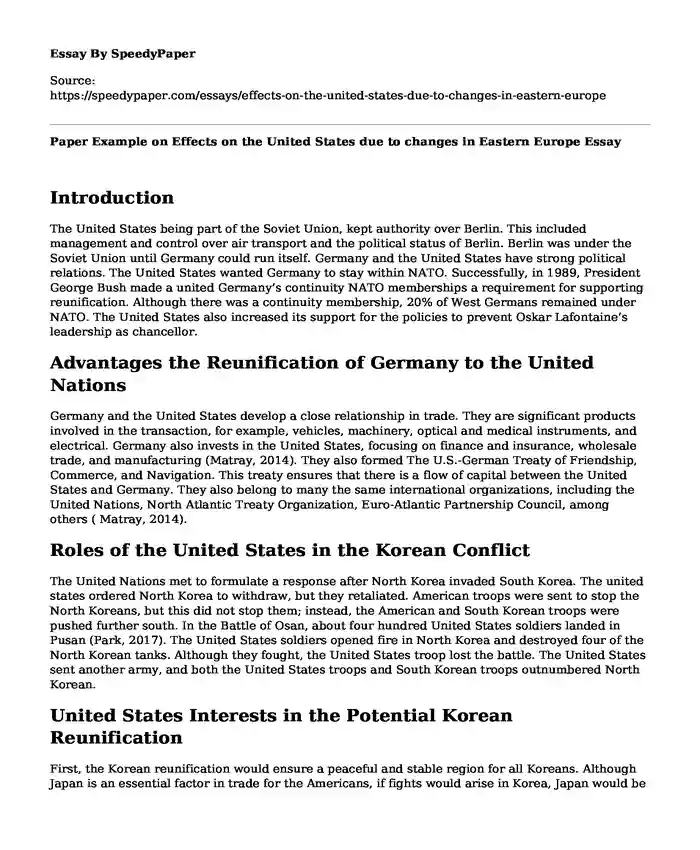
| Type of paper: | Essay |
| Categories: | United States Society Europe |
| Pages: | 3 |
| Wordcount: | 658 words |
Introduction
The United States being part of the Soviet Union, kept authority over Berlin. This included management and control over air transport and the political status of Berlin. Berlin was under the Soviet Union until Germany could run itself. Germany and the United States have strong political relations. The United States wanted Germany to stay within NATO. Successfully, in 1989, President George Bush made a united Germany’s continuity NATO memberships a requirement for supporting reunification. Although there was a continuity membership, 20% of West Germans remained under NATO. The United States also increased its support for the policies to prevent Oskar Lafontaine’s leadership as chancellor.
Advantages the Reunification of Germany to the United Nations
Germany and the United States develop a close relationship in trade. They are significant products involved in the transaction, for example, vehicles, machinery, optical and medical instruments, and electrical. Germany also invests in the United States, focusing on finance and insurance, wholesale trade, and manufacturing (Matray, 2014). They also formed The U.S.-German Treaty of Friendship, Commerce, and Navigation. This treaty ensures that there is a flow of capital between the United States and Germany. They also belong to many the same international organizations, including the United Nations, North Atlantic Treaty Organization, Euro-Atlantic Partnership Council, among others ( Matray, 2014).
Roles of the United States in the Korean Conflict
The United Nations met to formulate a response after North Korea invaded South Korea. The united states ordered North Korea to withdraw, but they retaliated. American troops were sent to stop the North Koreans, but this did not stop them; instead, the American and South Korean troops were pushed further south. In the Battle of Osan, about four hundred United States soldiers landed in Pusan (Park, 2017). The United States soldiers opened fire in North Korea and destroyed four of the North Korean tanks. Although they fought, the United States troop lost the battle. The United States sent another army, and both the United States troops and South Korean troops outnumbered North Korean.
United States Interests in the Potential Korean Reunification
First, the Korean reunification would ensure a peaceful and stable region for all Koreans. Although Japan is an essential factor in trade for the Americans, if fights would arise in Korea, Japan would be dragged down. This would mean the United States' trade with Japan would be affected. They also wanted to prevent the Domino Effect (Matray,2014). This was the most important reason for the involvement of the United States in the war.
Secondly, the United States also upheld the responsibility of helping countries that were threatened by communism. This is due to the commitment to the Truman Doctrine (Park, 2017). This doctrine established that the United States would provide political, military, or economic assistance to all democratic nations under threat, whether in external or internal authoritarian forces. The doctrine also ensured that the United States would not return to isolationism; instead, it would take an active role in world affairs.
Lastly, the USSR's belief was behind the North Korean invasion made the Americans determined to stop Stalin. They also did not want China to get involved with the fights and wanted to take advantage of the USSR's boycott of the UN, which would bring the UN to agree to military help to South Korea.
References
Berg, L. V., & Braun, E. (2016). National policy responses to urban challenges in Europe. Routledge.
Bozo, F., Rödder, A., & Sarotte, M. E. (2016). German reunification: A multinational history. Routledge.
Jr, P. D., & Matray, P. J. (2014). The Ashgate research companion to the Korean War. Ashgate Publishing.
Park, K. (2017). Focused on the North Korean nuclear issue analysis US-China conflicts and Korea’s choice. The Korean Journal of Political Science, 25(2), 33-52. https://doi.org/10.34221/kjps.2017.25.2.3
Strategic Studies Institute, & Coghlan, C. D. (2014). Prospects from Korean reunification. Lulu.com.
Cite this page
Paper Example on Effects on the United States due to changes in Eastern Europe. (2023, Dec 28). Retrieved from https://speedypaper.com/essays/effects-on-the-united-states-due-to-changes-in-eastern-europe
Request Removal
If you are the original author of this essay and no longer wish to have it published on the SpeedyPaper website, please click below to request its removal:
- Hawaii Population Essay Sample
- Free Essay Example on International Terrorism in Canada
- Essay Sample on the Role of Israeli Jewish Women on Religion in Modern Times
- Essay Example on the Principles of Economics at Work
- Essay Sample on impacts of the e-government on corruption across Asian countries
- Free Essay: Tennessee Prison System
- Essay Sample on Long Term Care and Migration
Popular categories




